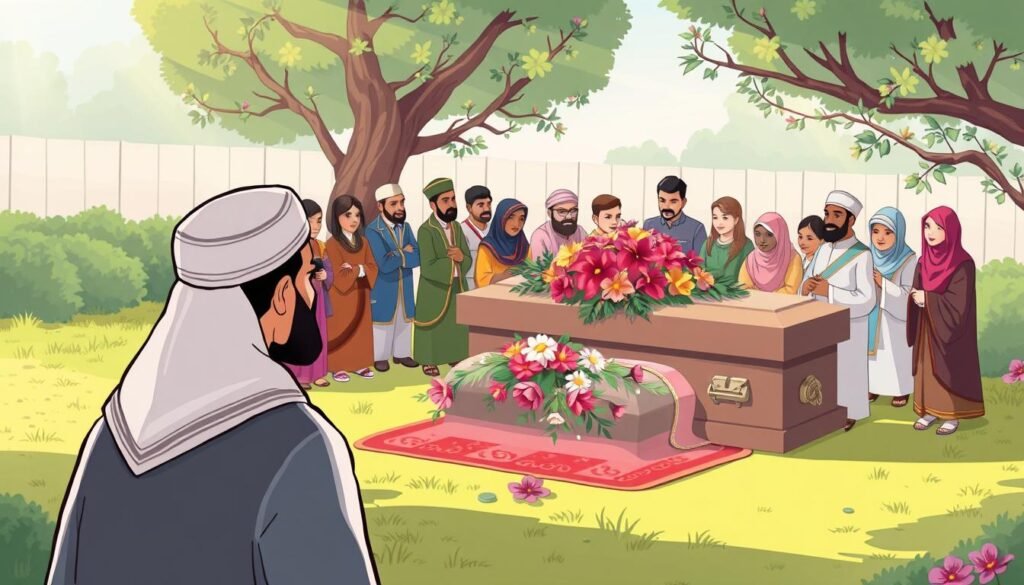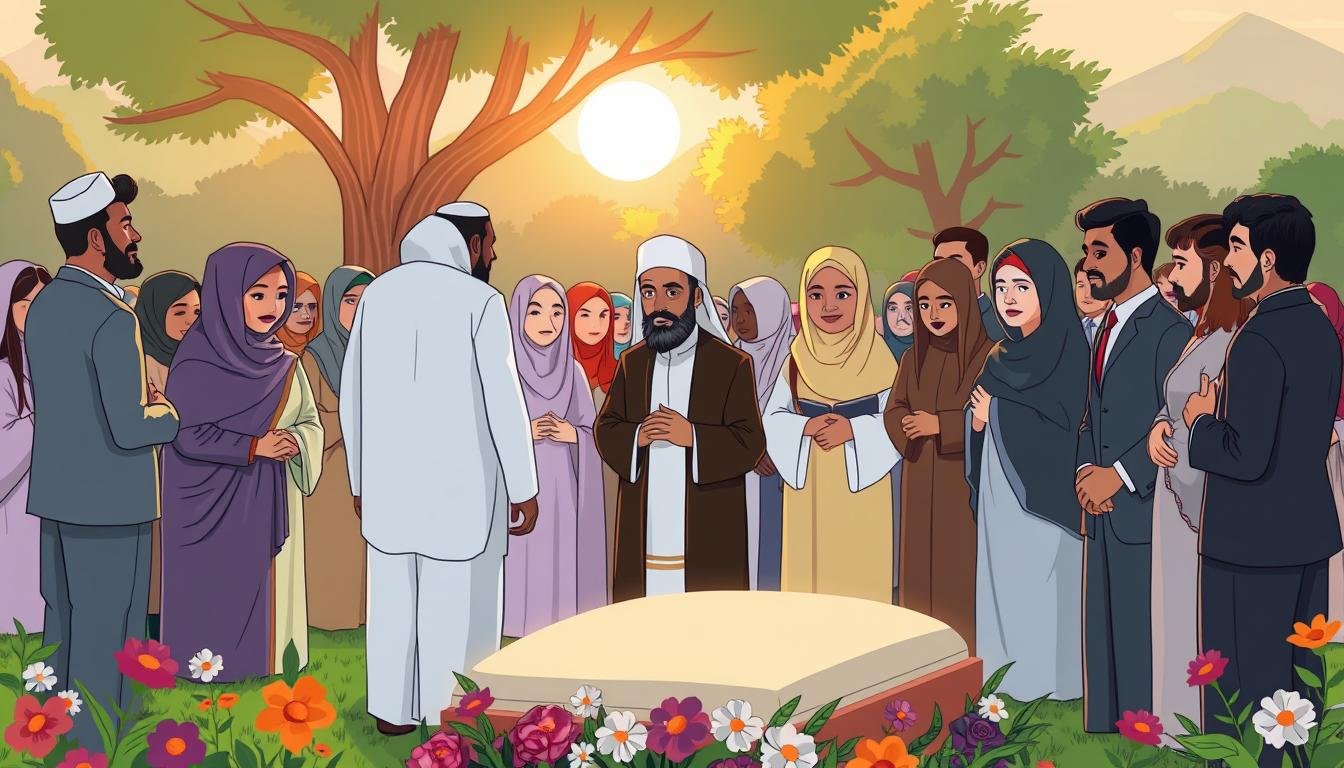Have you ever thought about if a Muslim can go to a non-Muslim funeral? This question is more complex than it seems. It touches on Islamic funeral rules and understanding different cultures. Many Muslims are unsure about their duties when a non-Muslim family member passes away.
We will look into what Islam says about attending funerals. We will also see how these teachings affect personal relationships and feelings.
Understanding Islamic Perspectives on Funerals
Islamic teachings on funerals give us a deep look into how Muslims deal with death. They come from the Quran and Hadith. These teachings show respect for the dead and the need to follow religious duties.
Funerals are not just for honoring the dead. They are also a time for the community to come together. This helps everyone support each other when they are sad.
Cultural views on funerals can change a lot. This affects how Islamic funeral customs are followed in different places. Even though there are many traditions, the main Islamic teachings stay the same.
The Quran says Muslims should not pray for non-believers. This means they should not pray at non-Muslim funerals. But, Muslims can show sympathy and support to non-Muslim family members. This shows kindness while staying true to their faith.
It’s important to understand these rules when thinking about going to non-Muslim funerals. Some might go because of family or culture. But, Islamic teachings help guide these decisions.
Understanding funerals in Islam helps us appreciate faith and culture more. By talking openly, we can bring our communities closer together. This is important, as seen in discussions about healthy living, like views on smoking.
Islamic Guidance for Attending Funerals
Islamic funeral guidance stresses the need to respect the faith during mourning. Muslims usually don’t go to non-Muslim funerals. But, certain situations might make them change their minds.
Funerals and beliefs are key in seeing how they match Islamic rituals. A Muslim funeral happens quickly, within 1-3 days after death. This shows how important a fast burial is in Islam.
The funeral prayer is a big part of the ritual. It’s a time for everyone to come together. Not just family and friends, but also the wider Muslim community is invited.
People who can’t attend are welcome to show support. These prayers help everyone feel connected, sharing the pain of loss.
Cultural rules also play a part in who can attend funerals. Women, for example, might not go to the burial in some places. But, how this varies shows the different ways cultures influence mourning.
Yet, one thing stays the same: the dress code. It’s always modest, showing respect for the serious nature of the event.
Can A Muslim Go To A Non Muslim Funeral?
Many wonder if Muslims can go to funerals of those who are not Muslim. This question is complex, with both religious and cultural views at play. Islamic teachings usually say no to Muslim attendance restrictions at such events, even for family members. This is because the Prophet Muhammad didn’t go to his non-Muslim uncle’s funeral.
Experts say going to non-Muslim funerals might seem like agreeing with beliefs that are not Islamic. This shows a conflict between faith against familial ties and the kindness Muslims should show to their relatives. Imam Maalik taught that Muslims should not join in rituals of non-believers. This matches the Quran’s advice to stay away from those who mock divine teachings.
Some think we should look at this issue in a more detailed way. They say keeping good relations with non-Muslim family members might make us rethink not going to funerals. It’s important to balance cultural and family ties with our beliefs. For more on this, check out the article on Muslim Culture Hub.
Religious Obligations and Duties
In Islam, we show great respect for human life, even if they are not Muslim. Going to funerals of non-Muslims shows our compassion and support for the community. As Muslims, we are told to keep good relationships with our non-Muslim family, friends, and workmates.
This shows we follow our religion and that going to funerals is okay. It’s more than just a rule. It’s about showing respect and care for others.
But, there are limits to how we act. We can’t pray for non-Muslims after they die. Scholars agree that showing respect for the dead is very important. For example, the Prophet Muhammad showed great respect during a Jewish funeral, showing us the value of respecting everyone, no matter their beliefs.
Islam teaches us to be kind to our parents, as the Quran says. We must treat them well, even if they don’t believe the same as us. Going to their funerals is a way to show respect and support. It helps us meet our duties while keeping our faith and community ties strong.

Reasons to Attend Funerals as a Muslim
Going to funerals is key for both personal beliefs and community duties. It shows respect, loyalty, and honors family ties. Islamic teachings guide us, but attending non-Muslim funerals has deeper reasons.
Maintaining Family Relationships
Family ties are vital, even for Muslims with family members of other faiths. Going to a non-Muslim funeral helps keep family bonds strong. Converts to Islam often face tough choices when a loved one dies.
Being there at the funeral shows they care about family and respect the deceased. Prophet Muhammad showed us the value of family by attending a Jewish funeral and burying his non-believing uncle. This teaches us to respect all family members, even if they believe differently.
Showing Respect for the Deceased
Respecting the deceased goes beyond religious lines. Muslims are urged to act ethically towards everyone, not just those who share their faith. The Quran teaches us to be fair and just with all people.
Actions like Abu Wael’s, who led his Christian mother’s funeral, show how we can honor the deceased. It’s not just about showing compassion. It’s also about recognizing our shared humanity.
Key Principles from the Quran and Hadith
Kindness is key in Islam, shown in the Quran and Hadith. These texts guide Muslims in everyday life and at big events like funerals. They teach us to be kind to everyone, showing respect and compassion.
Allah’s Command on Kindness
The Quran stresses the value of kindness to all, not just Muslims. The European Council for Fatwa and Research says we must be kind to parents and relatives, even in sad times like death. This shows kindness in Islam goes beyond faith, showing respect and compassion.
Teachings from the Prophet Muhammad
The Prophet Muhammad’s teachings also highlight kindness. He showed respect to a Jewish funeral procession, teaching us to honor all people. Islamic scholars like Dr. Salah Sultan say attending non-Muslim funerals of parents shows duty and love. This shows kindness in Islam is important for family ties, even when we disagree.
Distinguishing Between Different Types of Funerals
Funerals are where culture and religion meet. They show how different customs honor the dead. For example, Abrahamic religions believe in burying the body, showing respect for the earth.
Islam and Judaism don’t allow cremation or embalming. This shows their deep respect for the body.
When Muslims attend non-Islamic funerals, they see big differences. Islamic funerals happen quickly, often in 24 hours. Eastern Orthodox funerals have a three-day wake with Psalms.
Judaism has special rituals like washing the body, or “Tahara.” They also mourn by cutting black ribbons and tearing clothes. This shows their deep sadness.
In places like the UK, church funerals are less common. Now, more funerals happen at crematoriums. Roman Catholicism prefers burial but allows cremation with some rules.
Knowing about these funeral types helps Muslims decide if they should attend non-Muslim funerals. It’s about understanding and respecting different ways of saying goodbye.
Can Muslims be Part of Non-Muslim Funeral Rites?
Understanding what Muslims can do at non-Muslim funerals is key. It’s about knowing what’s okay and what’s not. Going to these funerals can show respect, but it’s important to stay true to your faith.
What Actions Are Permissible?
Islam allows some actions at non-Muslim funerals. Muslims can show kindness by going to these events. This is based on the Qur’an’s advice to be good to non-believers in family situations.
But, Muslims should not join in rituals that go against Islam. They should not take part in prayers that include false beliefs. It’s important to respect the deceased while staying true to Islamic values.
Limitations to Participation
There are big limits for Muslims at non-Muslim funerals. It’s not okay to go to a funeral of a non-Muslim relative who didn’t believe in Islam. The Prophet Muhammad (peace be upon him) didn’t go to his uncle’s funeral because he was a disbeliever.
Imam Maalik said Muslims should not help with washing or burying a non-believing parent. This rule is based on Islamic teachings about being friends with non-believers.

Views from Islamic Scholars
The funeral attendance debate in Islamic scholarship shows many views. Some scholars say going to non-Muslim funerals helps with social harmony and keeps family bonds strong. Others stick to old teachings that say not to go to funerals of other faiths.
In Islamic tradition, burying the dead is a big responsibility (farḍ kifāyah). It shows the importance of respecting the dead and helping families who are mourning. Islamic scholars keep talking about this, using both old texts and today’s issues like COVID-19.
For example, Ayatollah Al-Sistani has given rules to treat COVID-19 victims with respect during burial. This shows a balance between tradition and modern health worries. The talks about Islamic funeral practices, like in non-Muslim cemeteries, show how views can change in Islamic scholarship.
Islamic scholars’ different views help Muslims deal with funeral issues today. These talks make us think deeply about what the scriptures say and how they apply in today’s world.
The Importance of Cultural Sensitivity
Understanding Islamic practices and societal norms is key. It helps build respect among different groups. This leads to better communication and understanding between religions.
When Muslims go to non-Muslim funerals, they show respect and care. This act is important in Islam. It helps strengthen bonds and shows compassion.
Being culturally sensitive helps Muslims learn about others’ mourning ways. It also lets them share their beliefs. This respect is essential for living together peacefully.
By joining in each other’s traditions, we grow closer. We learn to understand and appreciate each other’s ways. This makes our communities stronger and more diverse.
Common Misconceptions about Muslim Attendance at Non-Muslim Funerals
Many people think Islam is strict about attending non-Muslim funerals. But, Islamic teachings are more flexible than believed. This allows Muslims to show kindness and respect without going against their faith.
Some cultural practices, like reading Surah Yasin, don’t have strong roots in Islam. They started after the Prophet Muhammad’s time. This can confuse people about what’s truly important in Islamic practices.
Many Muslims, including converts, feel sad when a non-Muslim relative or friend dies. About 45% struggle with Islamic teachings on salvation and their family’s fate. This shows the need for open talks to clear up misconceptions about Islam and build empathy.
Some Islamic scholars, about 32%, think Muslims should attend non-Muslim funerals in certain cases. This view promotes respect within the community while staying true to Islamic beliefs. It shows that being kind can be part of showing respect, even if it’s not the same as their faith.
Personal Experiences: Reverts and Family Funerals
In my search for conversion stories, I found tales of reverts at family funerals. These moments are filled with family love and spiritual duty. Many reverts share their struggles with grief and keeping their faith strong.
Imagine a revert mourning a non-Muslim parent. They might feel guilty for not sharing Islam enough. But, they know Allah guides us all.
Community support is key during tough times. Groups like 1-877-WHY-ISLAM help converts deal with loss. Sharing our stories helps us understand faith’s role in our lives.
FAQ
Can Muslims attend non-Muslim funerals?
What does the Quran say about funerals?
Are there any exceptions for attending non-Muslim funerals?
What actions are permissible for Muslims at non-Muslim funerals?
How can Muslims balance faith with cultural expectations during funerals?
What are some misconceptions about Muslim attendance at non-Muslim funerals?
What insights do Islamic scholars provide on funeral attendance?
What personal experiences have reverts shared about attending family funerals?

Embracing Faith, One Insight at a Time!
The teachings of the Quran have always guided my path. With a deep passion for Islamic knowledge, I strive to blend the wisdom of tradition with the relevance of today, making the timeless messages of Islam accessible and meaningful for everyone.
Muslim Culture Hub is my platform to share historical insights and thought-provoking articles, exploring both well-known and lesser-discussed aspects of Islamic culture and beliefs. My mission is to create an inclusive online space where everyone can learn, strengthen their faith, and connect with the profound message of Islam.
Join the journey!
May peace be upon you.








